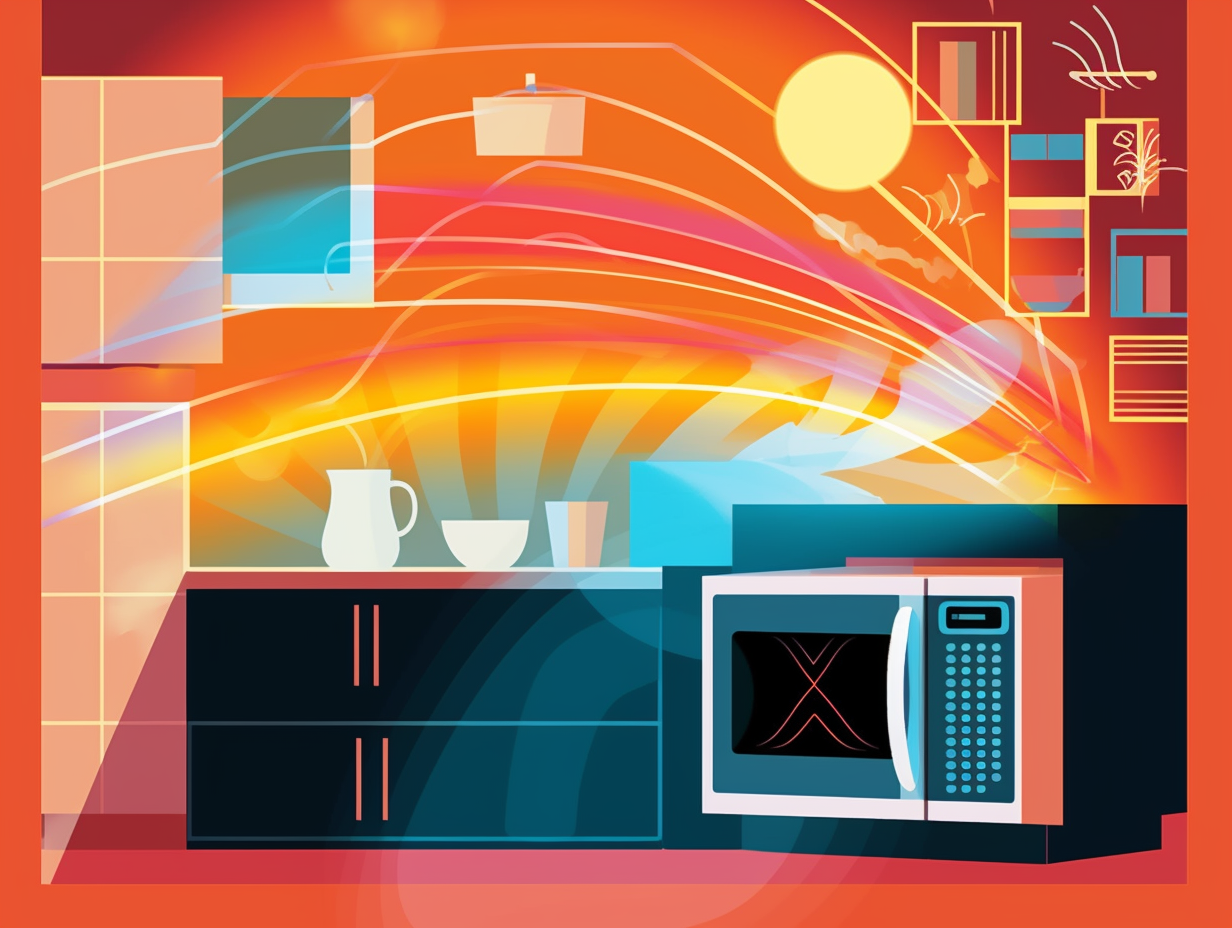Discover the Exciting World of Microwaves: Top 13 Electromagnetic Spectrum Fun Facts You Can't Miss!

1. Microwave Oven Dance Party Debate
You might think microwave ovens heat food like a magical, invisible dance party where water molecules boogie their pants off until things get steamy, but believe it or not, the science behind the groovy meal maker isn't quite settled: Some experts think microwave ovens heat food through friction caused by agitated water molecules, while others believe that the electromagnetic waves directly interact with the electrically polarized molecules in the food causing dielectric heating — but either way, they're a safe and snappy way to turn cold leftovers into mouth-watering delights.
Source => sciencebuddies.org
2. Microwave Spy Thriller
When life gives you clouds, make microwave lemonade: Microwaves, masters of disguise, can sneak past clouds and some foliage to gather intel on soil moisture, oil spills, and even Himalayan snow cover variations, turning Earth observation into a spy thriller.
Source => mdpi.com

Did you know radio waves were discovered accidentally in 1886, leading to a wireless communication revolution including radio, television, and mobile phones? Uncover the fascinating story behind these invisible waves! 📻📺📱💬
=> Fun Facts about Radio-Waves
3. Sneaky Communication Microwaves
In a world where size truly matters, beware the sneaky microwaves that can infiltrate communication devices in the blink of an eye: Microwaves possess a lower frequency and a longer wavelength than visible light (1 millimeter to 1 meter), yet they can still travel at the speed of light and play a crucial role in radios, cell phones, and GPS systems.
Source => en.wikipedia.org
4. Microwave Weathermen
When life gives you microwaves, make rain estimations! Yup, these handy kitchen gadgets have a weatherman side gig: Researchers have discovered that commercial microwave links can be used to gauge rainfall by analyzing the frequency, power resolution, and wet antenna attenuation. In fact, an entire year of data from a German-wide commercial microwave link network was effectively employed to estimate rainfall amounts.
Source => ncbi.nlm.nih.gov

5. Star Kitchens: Cosmic Microwaves
If stars had kitchens, they'd definitely have microwaves too: Microwaves are not only found in our earthly cooking contraptions, but also in the formation of stars and interstellar clouds where energetic plasma or radiation fields stimulate diatomic hydrogen and water molecules to emit microwaves, creating a phenomenon called "microwave amplification by stimulated emission of radiation" or "maser," ultimately shooting powerful beams of microwave radiation into space.
Source => nap.nationalacademies.org
6. Magnetic Campfire Science
When life hands you microwaves, you gather around the magnetic campfire to share some tasty roasted science: Microwave and RF energy has been used for non-communication purposes since 1966, and the International Microwave Power Institute (IMPI) was established that same year to connect over 200 international members, advancing the use of microwaves and RF energy in various applications like laboratory, industrial processing, and in the marketplace.
Source => impi.org
7. Microwaves: X-Ray Vision Superpower
"By peeping Tom's wavelength: Microwaves can see right through your clothes, and with the aid of copper-based metamaterials and mathematical algorithms, a nifty little camera can now detect and reconstruct images in real-time, making it perfect for airport scanners or helping law enforcement sleuth out concealed weapons from innocent cellphones!"
Source => wired.com
8. Hulk Hogan's Kitchen Rival
Back in the day, the real heavyweight champion of the kitchen didn't require a stove-top or an oven, but a "Radarange" microwave that could've pinned Hulk Hogan to the mat: introduced in 1947 by Raytheon, it weighed a whopping 340 kilograms (750 pounds), boasted a power of 3 kilowatts, and needed water to cool it down. However, by the 1970s, microwave ovens experienced a diet and price drop, making them a common household staple.
Source => historyofmicrowave.com
9. Paul Revere's Leftover Pizza
Once upon a Boston eatery in 1946, chefs dared to harness the invisible zap of electromagnetic waves, turning cold sandwiches into hot meals faster than you could say "Paul Revere's leftover pizza": The first commercial use of a microwave oven revolutionized the food industry, cutting down on waste, and serving up fresher dishes - all while ushering them into kitchens worldwide, even outselling gas ranges by 1975!
Source => celcook.ca

10. Smooth Criminal Microwaves
Microwaves: cooking food like a smooth criminal, moonwalking between radio waves and infrared light on the electromagnetic spectrum, but only holding up their pinky finger as to not harm their fellow man with ionizing radiation mischief: The microwave oven uses non-ionizing radiation to efficiently heat food from the inside out, as it is reflected by metal, passes through materials like glass, and penetrates edibles in a swift and delectable dance.
Source => volobeauty.com
11. Microwave Avengers: Saving the Planet
What happens when microwaves decide to "level up" and join the Avengers? They become "smart" and save the planet, one freeze-drying session at a time! The mind-blowing fact: Solid-state generators in microwave-assisted freeze-drying systems enable targeted electrical control of frequency, power, and phase shift, turning them into super-efficient, energy-saving devices that outperform conventional freeze-drying methods by reducing drying time significantly, all while maintaining a uniform heating distribution.
Source => mdpi.com
12. Microwave Social Butterflies
If microwaves attended a party, they'd be the social butterflies fluttering between the talkative radio waves and the radiant infrared crowd: In actuality, microwaves reside in the electromagnetic spectrum between infrared radiation and radio waves, boasting a frequency range of 300 MHz to 300 GHz and varying wavelengths from 1 meter to 1 millimeter. Their versatility makes them a staple in communication systems such as radars, satellites, and remote sensing, proving that they're not just a reliable guest to heat up those leftover party snacks!
Source => en.wikipedia.org
13. Multitasking Microwaves Unite!
If microwaves could talk, they'd be screaming "I'm not just for popcorn, people!" as they tune in to phone conversations, zap moisture out of plywood, and vulcanize rubber like a master chef on a mission: Microwaves, part of the non-ionizing electromagnetic spectrum family, are not only used in cooking but also play crucial roles in telecommunications, lumber drying, and rubber curing, all while being safely absorbed by various materials including food (from the inside out), glass, and paper.
Source => volobeauty.com
Related Fun Facts




















